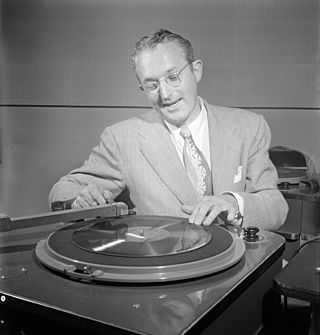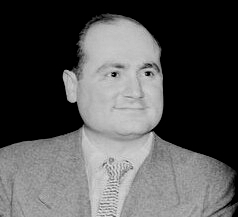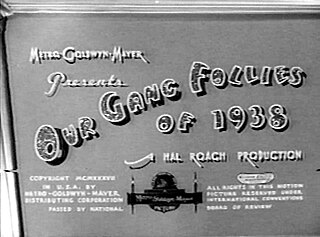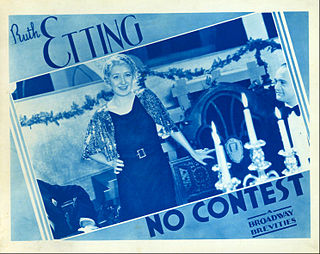Related Research Articles

Thomas Francis Dorsey Jr. was an American jazz trombonist, composer, conductor and bandleader of the big band era. He was known as the "Sentimental Gentleman of Swing" because of his smooth-toned trombone playing. His theme song was "I'm Getting Sentimental Over You". His technical skill on the trombone gave him renown among other musicians. He was the younger brother of bandleader Jimmy Dorsey. After Dorsey broke with his brother in the mid-1930s, he led an extremely successful band from the late 1930s into the 1950s. He is best remembered for standards such as "Opus One", "Song of India", "Marie", "On Treasure Island", and his biggest hit single, "I'll Never Smile Again".

Artie Shaw was an American clarinetist, composer, bandleader, actor and author of both fiction and non-fiction.

Bernard "Buddy" Rich was an American jazz drummer, songwriter, conductor, and bandleader. He is considered one of the most influential drummers of all time.
The swing era was the period (1933–1947) when big band swing music was the most popular music in the United States. Though this was its most popular period, the music had actually been around since the late 1920s and early 1930s, being played by black bands led by such artists as Duke Ellington, Jimmie Lunceford, Bennie Moten, Cab Calloway, Earl Hines, and Fletcher Henderson, and white bands from the 1920s led by the likes of Jean Goldkette, Russ Morgan and Isham Jones. An early milestone in the era was from "the King of Swing" Benny Goodman's performance at the Palomar Ballroom in Los Angeles on August 21, 1935, bringing the music to the rest of the country. The 1930s also became the era of other great soloists: the tenor saxophonists Coleman Hawkins, Ben Webster and Lester Young; the alto saxophonists Benny Carter and Johnny Hodges; the drummers Chick Webb, Gene Krupa, Jo Jones and Sid Catlett; the pianists Fats Waller and Teddy Wilson; the trumpeters Louis Armstrong, Roy Eldridge, Bunny Berigan, and Rex Stewart.
"What Is This Thing Called Love?" is a 1929 popular song written by Cole Porter, for the musical Wake Up and Dream. It was first performed by Elsie Carlisle in March 1929. The song has become a popular jazz standard and one of Porter's most often played compositions.
"Begin the Beguine" is a popular song written by Cole Porter. Porter composed the song during a 1935 Pacific cruise aboard the Cunard ocean liner Franconia from Kalabahi, Indonesia, to Fiji. In October 1935, it was introduced by June Knight in the Broadway musical Jubilee, produced at the Imperial Theatre in New York City.

Educational Pictures, also known as Educational Film Exchanges, Inc. or Educational Films Corporation of America, was an American film production and film distribution company founded in 1916 by Earle Hammons (1882–1962). Educational primarily distributed short subjects; it is best known for its series of comedies starring Buster Keaton (1934–37) and the earliest screen appearances of Shirley Temple (1932–34). The company ceased production in 1938, and finally closed in 1940 when its film library was sold at auction.
Richard Himber was an American bandleader, composer, violinist, magician and practical joker.

Jerry Gray was an American violinist, arranger, composer, and leader of swing dance orchestras bearing his name. He is widely known for his work with popular music during the Swing era. He worked with the bandleaders Artie Shaw and Glenn Miller.

Dave Tough was an American jazz drummer associated with Dixieland and swing jazz in the 1930s and 1940s.

Georgie Auld was a jazz tenor saxophonist, clarinetist, and bandleader.

Our Gang Follies of 1938 is a 1937 American musical short subject, the 161st short subject entry in Hal Roach's Our Gang series. Directed by Gordon Douglas as a sequel to 1935's Our Gang Follies of 1936, the two-reel short was released to theaters on December 18, 1937, by Metro-Goldwyn-Mayer.

The musical short can be traced back to the earliest days of sound films.

Broadway Brevities are two-reel musical and dramatic film shorts produced by Warner Bros. between 1931 and 1943. The series continued as Warner Specials in later years.
The Melody Masters were a series of first-rate big band musical film shorts produced by Warner Brothers, under the supervision of Samuel Sax at their Vitaphone studio in New York between 1931 and 1939, and in Burbank, California with producer Gordon Hollingshead in charge between 1940 and 1946.
George Dewey Washington (1898–1954) was an American singer active in vaudeville and motion pictures from the 1920s through the 1940s. He was a baritone or bass-baritone who often appeared on stage in the guise of "The Gentleman Tramp". He was sometimes compared to Al Jolson.

Up Swing is a compilation album of phonograph records released by bandleaders Tommy Dorsey, Glenn Miller, Benny Goodman, and Artie Shaw in 1944 as a part of the Victor Musical Smart Set series. The set, a progenitor to greatest hits releases, features some of the most popular Dance Band Era recordings by the four bandleaders.

Four Star Favorites is a compilation album of phonograph records released in 1941 by Artie Shaw and His Orchestra on Victor Records, containing studio recordings by his second, third and fourth orchestras.
Joseph P. Lippman was an American composer, arranger, conductor, pianist, and songwriter working in jazz and traditional pop. His musical career was over five decades long, having started at age 19 with the Benny Goodman orchestra in 1934 and writing for television, films, and Broadway in the 1980s. He composed and arranged for Bunny Berigan, Jimmy Dorsey, Sarah Vaughan, Charlie Parker and worked as staff arranger in television for Perry Como and Hollywood Palace.
References
- ↑ Motion Picture Herald - Volume 123 1936 - Page 73 "Paramount CAVALCADE OF MUSIC, THE: Headliners— A Paramount Headliner that is better than the average one reeler. Running time, 1 reel. — C. A. Jordan, Opera House, Cogswell,
- ↑ Jim Cox Musicmakers of Network Radio: 24 Entertainers, 1926-1962 2012 p.268 "... years hence—together with Al Neibur and Abner Silver—Ross co-wrote the song Listen to My Heart. Backed by an orchestra conducted by Richard Himber, Patricia Gilmore sang it in the 1939 short film Tempo of Tomorrow."
- ↑ Jazz on Film and Video in the Library of Congress Rebecca D. Clear - 1993- Page 10 FBC 4365 A Paramount Headliner featuring Artie Shaw and his Orchestra performing the numbers "I Have Eyes," "Nightmare, " "Shoot the Likker to Me John Boy" and "Table d'Hote" with Buddy Rich on drums.
- ↑ Modern Drummer 1985 "The Shaw band appears again in A Class In Swing, a Paramount headliner with Buddy Rich on drums. The closer is "Shoot The Likker To John Boy," featuring Rich working with only one floor torn.
- ↑ Klaus Stratemann Buddy Rich and Gene Krupa: a filmo-discography 1980 - Page 8 "ARTIE SHAW'S CLASS IN SWING 1939 (A Paramount Headliner) Paramount Pictures Corp. (c) 8 Sep 39, MP 9634 Released same date, release No. A 9-1 Dir.: Leslie Roush